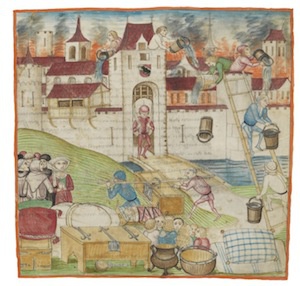RHN 143/2013 | Call
Organisers: Prof. Dr. Gerlinde Huber-Rebenich; Prof. Dr. Christian Rohr; Prof. Dr. Michael Stolz (Berner Mittelalterzentrum, Universität Bern)
22–25 March 2015, University of Bern, Switzerland
Deadline: 28 February 2014
The 16th Symposium of the Mediävistenverband
Water in Medieval Culture
Water is life. Individual organisms, social formations, and cultural achievements all depend on water. It is used in both pragmatic and symbolic contexts. Being a life-sustaining as well as a destructive force, water connects and divides, absolves and dissolves. Society as a whole and individual institutions alike need to engage with, and adapt to, these ambivalent aspects of water. As a natural element, water provokes cultural reactions in regard to its utilization, evaluation, and symbolism. The different functions water fulfils in the natural world are also addressed and negotiated in literature and the visual arts.
We seek papers which address questions relating to any of the four threads for this conference:
I. Environment – Climate – Ecology
Macrocosmic Dimension of Water and the Other Elements – States of Matter – Natural Disasters – Water Supply (Technology, Management, Sanitation) – Luxury – Exploitation of Hydropower – Water Regulation.
In the field of environmental and climate history, the (macro)cosmic dimension of water, which often also relates to the other elements (fire, air, and earth), has received increasing attention. The use of waterpower is largely dependent on the different states of matter water can assume. It can be utilised for the satisfaction of both the most basic and extravagant human needs. Here, meteorological, technical, procedural, sanitary, and legal aspects are significant. Where water cannot be controlled, its destructive power becomes manifest, for instance in the form of natural disasters such as floods or droughts.
II. Means of Transportation, Boundary, Bases of Power
Waterways – Navigation – Trade Routes – the Hanse – La Méditerranée (F. Braudel) – Natural Boundaries and Their Conquest – Thalassocracies.
Waterways have been used as transportation routes since the beginnings of early human history and thus form an important basis of social interaction and communication. At the same time, they form natural boundaries, which often need to be alternately dissolved or solidified in the course of cultivation. Rivers, lakes, seas, and their shores can form trade routes, paths for (inter)cultural exchange, and alliances of convenience (e.g. the Hanse). Conflicts over water and its monopolisation arise again and again, often ending in war.
III. Natural History and Natural Philosophy
Creation Myths and Stories – Microcosmic Dimension of Water in Human Body – Humoral Pathology – Medicine – Treatises on Natural History.
In natural history and philosophy, water fulfils important epistemological functions and becomes a key element in the generation of knowledge and science. Water is part of origin and creation myths as well as their surrounding narratives (the corresponding German terminology also being associated with water). The proportion of water in the human body points to the microcosmic dimension of the element and forms an important part of medieval medicine (e.g. humoral pathology).
IV. Symbolism (Symbolbildungen)
Religious and Cultic Functions – Symbolic Meanings of Water in Literature and Art.
The generation of symbols is closely linked to aspects of the history of science. Here, water takes on cultic and religious functions and comes to serve as a polyvalent motif and sign – of punitive deluge, fabulous springs, baptismal or holy water. Further examples can be found in the fountain of muses, the imagery of emanation, the fountain of life, and various cultural concepts of borders and fusion. All these aspects are reflected in artistic and literary representations of water.
We invite abstracts for both individual papers (1500 characters) and panels (7000 characters). Papers should not exceed 20 minutes. All submissions should contain the following information:
- Cipher of the thread (I-IV)
- Panels: number of papers (as a rule 90 minutes for 3 papers, including discussion). Please note that panels ought to include speakers working in different disciplines (panels of three: at least two different disciplines, panels of four: at least three different disciplines).
Please do NOT submit abstracts which do not pertain to any of the four threads. Contributions of young researchers within teams are highly welcome.
Please send your proposals, preferably by e-mail (attachments) by 28 February 2014 to the following address: E-Mail: wasser2015@kps.unibe.ch
Contact: Prof. Dr. Gerlinde Huber-Rebenich
Institut für Klassische Philologie, Universität Bern
Länggassstrasse 49
CH-3012 Bern
Source: http://www.mediaevistenverband.de/symposium/16-symposium-2015/
